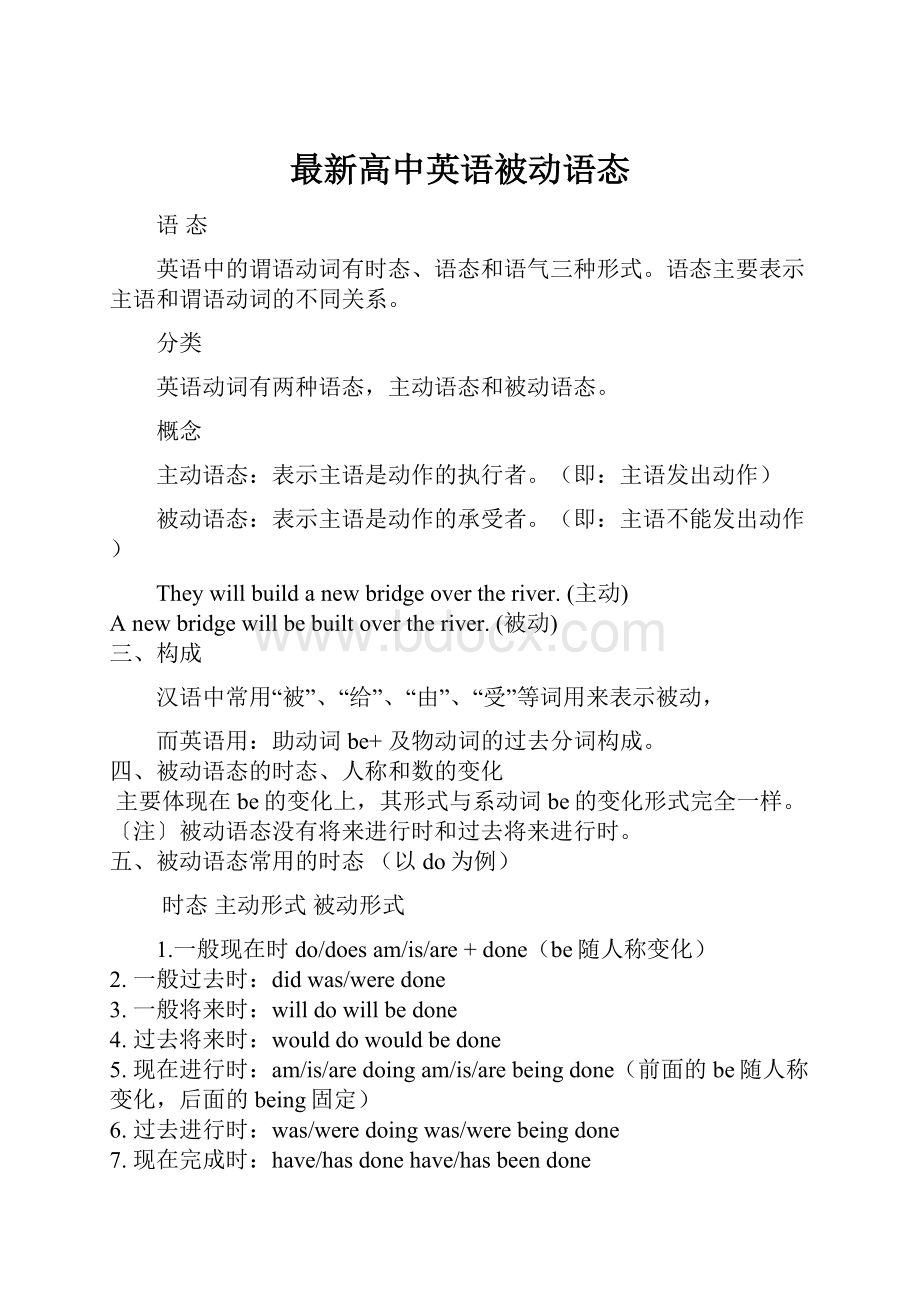最新高中英语被动语态.docx
《最新高中英语被动语态.docx》由会员分享,可在线阅读,更多相关《最新高中英语被动语态.docx(24页珍藏版)》请在冰豆网上搜索。

最新高中英语被动语态
语态
英语中的谓语动词有时态、语态和语气三种形式。
语态主要表示主语和谓语动词的不同关系。
分类
英语动词有两种语态,主动语态和被动语态。
概念
主动语态:
表示主语是动作的执行者。
(即:
主语发出动作)
被动语态:
表示主语是动作的承受者。
(即:
主语不能发出动作)
They will build a new bridge over the river. (主动)
A new bridge will be built over the river. (被动)
三、构成
汉语中常用“被”、“给”、“由”、“受”等词用来表示被动,
而英语用:
助动词be+ 及物动词的过去分词构成。
四、被动语态的时态、人称和数的变化
主要体现在be的变化上,其形式与系动词be的变化形式完全一样。
〔注〕被动语态没有将来进行时和过去将来进行时。
五、被动语态常用的时态(以do为例)
时态主动形式被动形式
1.一般现在时 do/doesam/is/are+done(be随人称变化)
2. 一般过去时:
didwas/weredone
3. 一般将来时:
willdowillbedone
4. 过去将来时:
woulddowouldbedone
5. 现在进行时:
am/is/aredoingam/is/arebeingdone(前面的be随人称变化,后面的being固定)
6. 过去进行时:
was/weredoingwas/werebeingdone
7. 现在完成时:
have/hasdonehave/hasbeendone
8.现在完成进行时have/hasbeendoinghave/hasbeenbeingdone
9. 过去完成时:
haddonehadbeendone
10. 有情态动词:
情态动词+do情态动词+ be+ done
11.含有不定式结构:
todotobedone
六、主动语态变被动语态的步骤
1. 把主动语态的宾语变成被动语态的主语。
2. 把主动语态的谓语变成被动语态的be+ 过去分词,时态要与原句保持一致。
3. 把主动语态的主语变为介词by的宾语,放在被动语态里谓语动词之后,如不必强调动作的执行者by短语可以省略。
七、被动语态的使用
1. 当不知道或没有必要指出动作的执行者时,常用被动语态,这时往往不用by短语。
Mywatchwasstolen.
2. 突出或强调动作的承受者,如果需要说出动作的执行者,用by短语。
The cup was broken by Paul.
3. 当汉语句子的主语既不是动作的执行者,也不是动作的承受者时,这时常用in+ 名词作状语,而代替by短语。
These cars were made in China.
八、语态转换时所注意的问题
1. 把主动语态变为被动语态时,其谓语动词的时态要与原句时态保持一致,其谓语动词的数要与新主语保持一致。
We have bought a new computer.
A new computer has been bought.
I was given a present on my birthday.
如果把直接宾语(指物)改为主语,则在间接宾语(指人)前加适当的介词,如上句还可以说:
A present was given to me yesterday.
注意:
一般在下列动词后,常在间接宾语前用介词to,如:
bring, give, hand, lend, offer, pass, pay, promise, sell, show, take, teach, tell等。
The magazine was passed on to me.
一般在下列动词后,间接宾语前用介词for, 如:
build, buy, cook, cut, choose, do, fetch, find, fix, get, keep, make, order, paint, play, sing等。
Mother made me a new skirt.
A new skirt was made for me.
有些既不用to也不用for, 根据动词与介词的搭配关系。
He ask me a question. A question was asked of me.
People all over the world know the Great Wall.
The Great Wall is known to people all over the world. (不用by短语)
3. 由动词+ 介词或副词构成的短语动词,要把它们作为整体看,即把它们看成一个及物动词,介词或副词不可拆开或漏掉。
这类动词有:
如:
agree to, ask for, laugh at, operated on, listen to, look after, think of, talk about等。
The patient is being operated on.
The problem is solved. It needn't be talked about.
如bring about, carry out, find out, give up, hand in, make out, pass on, point out, put away, put off, think over, turn down, work out, turn out等。
His request was turned down.
The sports meet will be put off because of the bad weather.
4. 带复合宾语(宾语+ 宾补)的动词改为被动语态时,一般把主动结构中的宾语改为主语,而宾语补足语保留在谓语动词后面。
如:
We always keep the classroom clean.
The classroom is always kept clean.
She told us to follow her instructions.
We were told to follow her instructions.
注意:
在see, watch, hear, notice, listen to, look at, make, feel等动词后作宾语补足语的动词不定式都不带to,但改成被动语态后都带to,这时不定式为主语补足语,也就是说不定式作主语补足语不存在省略to的问题。
We often hear him play the guitar.
He is often heard to play the guitar.
The earthquake made the road fall onto another one below.
The road was made to fall onto another one below by the earthquake.
注意:
带有复合宾语的句子,如果宾语补足语是名词,变被动句时,应将宾语变为主语,不要误把宾语补足语的名词作主语。
如:
Tomatoes were first taken back to Europe and people called them love apples.误:
Love apples were called them.
正:
They were called love apples.
5. 还有一种短语动词由动词+ 名词+ 介词构成,变被动语态有两种形式,如下:
We take good care of the books.
The books are taken good care of.
6. 当主动句的主语是nobody, no one等含有否定意义的不定代词时,被动句中将其变为anybody, 作by的宾语,并将谓语动词变为否定的被动语态。
如:
Nobody can answer this question.
The question can not be answered by anybody.
7. 当否定句中的宾语是anything, anybody, anyone等不定代词时,在被动句中应将其分别变为nothing, nobody, no one作主语,并将谓语动词变为肯定的被动语态。
如:
They haven't done anything to make the river clean.
Nothing has been done to make the river clean.
8. 以who为主语开头的疑问句,变被动时,用by whom放在句首:
Who wrote the story?
By whom was the story written?
9. 有些动词既是及物又是不及物,当它们和well, badly, easily等副词连用时,表示主语内在品质或性能,是不及物动词,用主动表示被动,这时不用被动语态,常见的有:
write, read, clean, sell, wash, cook等。
如:
The cloth washes easily. 这布很好洗。
The new product sells well. 这新产品很畅销。
The pen writes smoothly. 这支笔写字很流畅。
The books sell well. (主动句)
对比:
The books were sold out. (被动句)
The meat didn't cook well. (主动句)
对比:
The meat was cooked for a long time over low heat. (被动句)
10. 下列情况主动句不能改为被动句:
第一,感官系动词一般用主动形式表示被动意义,如:
feel,look, seem, taste, sound, remain等。
——Do you like the material?
——Yes, it feels very soft.
误:
It is felt very soft.
The food tastes delicious.
误:
The food is tasted delicious.
The pop music sounds beautiful.
误:
The pop music is sounded beautiful.
第二,谓语是及物动词leave, enter, reach, suit, have, benefit, lack, own等。
如:
He entered the room and got his book.
误:
The room was entered and his book was got.
She had her hand burned.
误:
Her hand was had burned.
第三,一些不及物动词短语没有被动语态,如:
take place, break out, belong to, lose heart, consist of, add up to等。
如:
The fire broke out in the capital building.
误:
The fire was broke out in the capital building.
第四,不及物动词没有被动语态,如:
rise, happen, succeed, remain, lie等。
1)When we got to the top of the mountain, the sun had already risen.
误:
The sun had already been risen.
2)After the earthquake, few houses remained.
误:
After the earthquake, few houses were remained.
第五,宾语是反身代词,相互代词,同源宾语,不定式,v-ing形式及抽象名词等,不能变为被动句子的主语,如:
I taught myself English.
误:
Myself was taught English.
We love each other.
误:
Each other is loved.
11. 汉语有一类句子不出现主语,在英语中一般可用被动结构表示,如:
据说……It is said that… .
英语专题被动语态
一、被动语态概述
语态是动词的一种形式,用以说明主语与谓语动词之间的关系。
英语的语态共有两种:
主动语态和被动语态。
主动语态表示主语是动作的执行者,被动语态表示主语是动作的承受者。
被动语态是动词的一种特殊形式,一般说来,只有需要动作对象的及物动词才有被动语态。
汉语往往用“被”、“受”、“给”等词来表示被动意义。
如:
Heopenedthedoor. 他打开了这扇门。
(主动语态)
Thedoorwasopened. 这扇门被打开了。
(被动语态)
二、被动语态的构成
被动语态由“助动词be+及物动词的过去分词”构成。
被动语态的时态变化只改变be的形式,过去分词部分不变。
疑问式和否定式的变化也如此。
1、被动语态的时态较常见的八种,现以动词clean为例列表说明:
2、被动语态的句式变化:
以一般现在时和动词invite为例,列表说明被动语态的句式变化:
3、含有情态动词的被动语态
情态动词的被动语态结构为:
情态动词+be+过去分词;
其时态及句型的变化仅由情态动词完成,“be+过去分词”部分不变。
如:
Tablescanbemadeofstone. 桌子可由石头制造。
Tablescouldbemadeofstoneatthattime. 那时桌子可由石头制造。
(一般过去时)
Cantablesbemadeofstone?
桌子能用石头制造吗?
(疑问句)
三、被动语态的用法:
1、不知道或没有必要指出谁是动作的执行者时。
如:
Thebridgewasbuiltlastyear. 这座桥是去年建造的。
Hewaselectedchairman. 他被选为主席。
2、当更加强调动作的承受者时。
此时动作的执行者由by引导置于谓语动词之后,不需要时可以省略。
如:
Theroomhasn'tbeencleanedyet. 房间还没有打扫。
Thetigerwaskilledbyhim. 老虎被他杀死了。
3、当动作的执行者不是人时,多用被动语态。
如:
Thewindowwasblownbywind. 窗户被风吹开了。
Thewholevillagehasbeenwashedawaybytheflood. 整个村庄都被洪水冲走了。
4、表示客观的说明常用“Itis+过去分词”句型。
如:
ItissaidthatLucyhasgoneabroad. 据说露茜已经出国了。
Itisbelievedthatheisaspy.(=Heisbelievedtobeaspy.) 大家相信他是个间谍。
其它常见的“Itis+过去分词+that”句型还有:
Itisreportedthat…据报道
Itissaidthat…据说
Itisbelievedthat…大家相信
Itissuggestedthat…有人建议
四、主动语态变为被动语态
转换图示:
1、主动语态变为被动语态的步骤:
(1)将主动句的宾语变为主语:
注意:
如果主动句的宾语是代词,需将其由宾格变为主格。
如:
Tomkilledhim.→HewaskilledbyTom.
(2)将动词改为“be+过去分词”。
注意:
Theyheldameetingyesterday.→Ameetingwasheldbythemyesterday.
他们昨天开会了。
(3)将主动语态的主语改为by…放在谓语动词后。
注意:
如果原主语是代词,则应由主格变为宾格。
如:
Hesangasong.→Asongwassungbyhim.
2、主动语态变为被动语态的注意事项:
(1)主动句中的主语如果是people,we,you,they,somebody等含糊地表示“人们”、“大家”的单词,变为被动句时,通常删去“by…”,但原主语被强调时除外。
如:
Theysetupthishospitalin1975.→Thishospitalwassetupin1975.
这所医院建于1975年。
Onlyhecanfinishthejob.→只有他能完成这项工作。
Thejobcanbefinishedonlybyhim.这项工作只能由他来完成。
(2)含有双宾语,即直接宾语和间接宾语的句子,每个宾语都可变为被动语态的主语,即其被动语态有两种形式。
但多以间接宾语作主语。
如:
Jacktoldusthetruth.杰克告诉了我们真相。
WeweretoldthetruthbyJack.
Thetruthwastold(to)usbyJack.
五、动词的主动形式表示被动之意
以主动形式表示被动之意的动词多为连系动词,如:
look,feel,smell等。
下列动词没有被动式:
happen,cost,have
如:
Anaccidentwashappenedyesterday.(×)昨天发生了一起事故。
Anaccidenthappenedyesterday.(
)
Theflowersmellssweet.这花闻起来很香。
Thewatchlooksgood.这表看起来很好。
Thisbooksellswell.这本书畅销。
六、各种时态的被动语态举例(以动词do为例)
1.一般现在时(am/is/are+done)
如:
Englishisspokenbylotsofpeopleintheworld.世界上的许多人都说英语。
ClassmeetingisheldeveryThursday.每周四都举行班会。
Theclassroomiscleanedbythestudentseveryday.学生们每天都打扫教室。
2.一般过去时(was/were+done)
如:
Thecupwasbrokenbytheboy.杯子被那个男孩打碎了。
Hewassavedatlast.他最终获救了。
Mybikewasstolen.我的自行车被偷了。
3.一般将来时与过去将来时(will/shallbe+done;would/shouldbe+done)
如:
Aspeechwillbegiventhisafternoon.今天下午有一个演讲。
Anewroadwillbebuiltnextyear.明年要修一条新马路。
Ithoughtthousandsofpeoplewouldbehelped.我认为将有数千人得到帮助。
4.现在进行时与过去进行时(am/is/arebeing+done;was/werebeing+done)
如:
Themachinewasbeingrepairedatthistimeyesterday.昨天这时,机器正在被修理。
Theproblemisbeingdiscussednow.问题正在被讨论。
Abusisbeingpushedbythepassengers.路人正在推一辆公共汽车。
5.现在完成时(have/hasbeen+done)
如:
Twohundredtreeshavebeenplantedbynow.到现在为止,已经种了二百棵树了。
Thebookhasbeenreadmanytimesbyme.这本书已经被我读了许多遍了。
Severalsoldiershavealreadybeenkilledintheconflict.
在冲突中已经有几名士兵被杀害。
6.过去完成时(hadbeen+done)
如:
Theysaidtheyhadbeeninvitedtotheparty.他们说他们已经被邀请参加晚会了。
Shefoundthehousehadbeendestroyedbythestorm.她发现房子已经被暴风雨摧毁。
Hehadbeentorturedbytheillnessformanyyearsbeforehedied.
他在去世前已经被疾病折磨很多年了。
据报导……It is reported that…
据推测……It is supposed that…
希望……It is hoped that…
众所周知……It is well known that…
普遍认为……It is generally considered that…
有人建议……It is suggested that…
1)It is reported that it is going to rain tomorrow.
2)It is well known that Thomas Edison invented the electric lamp.
在英语语言中,被动语态是极常见的语言现象,人们进行语言交际,离不开对被动语态的使用,熟练掌握被动语态也为下一步学习打下